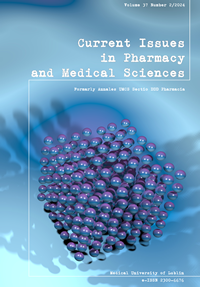Anti-tumor and anti-oxidant effects of Ganoderma lucidumextracts on oral squamous cell carcinoma and skin squamous cell carcinoma in vitro
DOI:
https://doi.org/10.2478/cipms-2024-0013Keywords:
cytogenetic, chromosomal aberrations, mitotic index, mushroom, water extractAbstract
Ganoderma lucidum has had great importance in healthcare in the Chinese for many decades. Polysaccharides and triterpenoids are one of the most important components of G. lucidum. Biological evidence indicates that this mushroom can be a promising treatment in many cancer cases and reduce the toxic effect of chemotherapy and radiotherapy if taken synchronously. This study highlights preparing an extract with therapeutic effects capable of removing free radicals and protecting cell membranes from hyperoxidation effects. The antitumor effect was evaluated on two types of cancer cell lines in vitro, Human Oral Squamous Cell Carcinoma (HOSCC) and Human Skin Squamous Cell Carcinoma (HSSCC), at different concentrations 0.0-1600 μg/mL. Antioxidant by DPPH assay was assessed at concentrations from 0.0-500 μg/mL, in addition to their effects on cytogenetic indicators such as mitotic index (MI), blastogenic index (BI) and total chromosomal aberration (TCAs) for three types of extracts (ethanol extract, water extract and acidified water extract). The results recorded an increase in the antioxidant activity of the three extracts, and that the acidified water extract had the highest effect, reaching a killing rate of 78.53% for the acidified water extract on the HOSCC cell line. Chromosomal stability indicates that the three extracts enhanced the cytogenetics parameters and supported chromosomal stability by increasing both mitotic index (MI) and blastogenic index (BI), while reducing chromosomal aberrations.
References
1. Ahmad M, Ahmad F, Khan M, Alsayegh A, Wahab S, Alam M, Ahmed F. Ganoderma lucidum: a potential source to surmount viral infections through b-glucans immunomodulatory and triterpenoids antiviral properties.Int J Biol Macromol.2021;187:769-79.
2. Brand-Williams W, Cuvelier ME, Berset C. Use of a free radical method to evaluate antioxidant activity.Lebenson Wiss Technol.1995;28:25-30.
3. Deng Y, Ma J, Zhang Q. Dynamic biomarkers indicate the immunological benefits provided by Ganoderma spore powder in post-operative breast and lung cancer patients.Clin Transl Oncol.2021;23(7):1481-90.
4. Jeitler M, Michalsen A, Frings D, Hübner M, Fischer M, Koppold-Liebscher DA, et al. Significance of medicinal mushrooms in integrative oncology: A narrative review.Front Pharmacol.2020;11:580656.
5. Jiang M, Wu Z, Liu L, Chen S. The chemistry and biology of fungal mer- oterpenoids (2009e2019).Org Biomol Chem.2021;19:1644-704.
6. Khursheed R, Singh S, Wadhwa S, Kapoor B, Gulati M, Kumar R, et al. Treatment strategies against diabetes: Success so far and challenges ahead.Eur J Pharmacol.2019;862: 172625.
7. Malvindi M, Brunetti V, Vecchio G, Galeone A, Cingolani R, Pompa P. SiO2nanoparticles biocompatibility and their potential for gene delivery and silencing.Nanoscale.2012;4(2):486-95.
8. Sohretoglu D, Huang S. Ganoderma lucidum Polysaccharides as an anti-cancer agent.Anti Cancer Agents Med Chem.2018;18(5):667-74.
9. Zhang J-J, Wang D-W, Peng Y-L, Katta MK, Dong H-Q, Cheng Y-X. Structural characterization of minor optically pure and impure meroterpenoid-type compounds in Ganoderma lucidum and structure revision of spirolingzhine D.Tetrahedron.2022;(125): 133039.
10. Zhang,Y. Ganoderma lucidum (Reishi) suppresses proliferation and migration of breast cancer cells via inhibiting Wnt/β-catenin signaling.Biochem Biophys Res Commun.2017;488: 679-84.
11. Vemra R Babu, A.Human chromosomes: Manual of basic techniques. 1stprinting. Pergamon Press, Inc. New York; 1989.
12. Chan WK, Cheung CC, Law HK, Lau YL, Chan GC. Ganoderma lucidum polysaccharides can induce human monocytic leukemia cells into dendritic cells with immuno-stimulatory function.J Hematol Oncol.2008;21:9.
13. Lee JM, Kwon H, Jeong H. Inhibition of lipid peroxidation and oxidative DNA damage byGanoderma lucidum. Phytother.Res. 2001;15:245-9.
14. Ma Ch, Feng M, Zhai X, Hu M, You L, Luo W, et al. Optimization for the extraction of polysaccharides from Ganoderma lucidum and their antioxidant and antiproliferative activities.J Taiwan Inst Chem Eng.2013;44:886-94.
15. Zhao W, Jiang X, Deng W, Lai Y, Wu M, Zhang Z. Antioxidant activities of Ganoderma lucidum polysaccharides and their role on DNA damage in mice induced by cobalt-60 gamma-irradiation.Food Chem Toxicol.2012;50:303-9.
16. Haleem AA, Hameed AH, Al-Majeed RA, Hussein NN, Hikmat RA, Queen BK. Anticancer, antioxidant, antimicrobial and cytogenetic effects of ethanol leaves extract ofCarthamus tinctorius.IOP Conf. Series: Earth Environ Sci. 2023;1262:052035.
17. Al-Nuzal SM, Haleem AM, Ken Czerwinski and Haleem SM. New dithiocarbamates as a possible human serum albumin metal carrier in drug delivery systems and their antioxidant and antiproliferative activities.IOP Conf. Series: Earth Environ Sci.2021;779:012048.
18. Zhu XL, Chen AF, Lin ZB. Ganoderma lucidum polysaccharides enhance the function of immunological effector cells in immunosuppressed mice.J Ethnopharmacol.2007;111:219-26.
19. Man Q. The inhibition effect on mouse melanoma cells train by Ganoderma lucidum polysaccharidesin vitro. Hebei Med.2009;15:400-2.
20. Lu QY, Jin YS, Zhang Q, Zhang Z, Heber D, Go VL. Ganoderma lucidum extracts inhibit growth and induce actin polymerization in bladder cancer cellsin vitro. Cancer Lett.2004;216:9-20.
21. Wang PY, Zhu XL, Lin ZB. Antitumor and immunomodulatory effects of polysaccharides from broken-spore of ganoderma lucidum.Front Pharmacol.2012;3:135.
22. Nonaka Y, Ishibashi H, Nakai M, Shibata H, Kiso Y, Abe S. Effects of the antlered form of Ganoderma lucidum on tumor growth and metastasis in cyclophosphamide-treated mice.Biosci Biotechnol. Biochem.2008;72:1399-408.
23. Uesaka HT, Katoh O, Kyo E. Watanabe H. Prevention of the development of preneoplastic lesions, aberrant crypt foci, by a water-soluble extract from cultured medium of Ganoderma lucidum (Reishi) mycelia in male F344 rats.Oncol Rep.2001;8:1341-5.
24. Zhu XL, Chen AF, Lin ZB. Ganoderma lucidum polysaccharides enhance the function of immunological effector cells in immunosuppressed mice.J Ethnopharmacol.2007;111:219-26.
Downloads
Published
Issue
Section
License
Copyright (c) 2024 Authors

This work is licensed under a Creative Commons Attribution-NonCommercial-NoDerivatives 3.0 Unported License.


